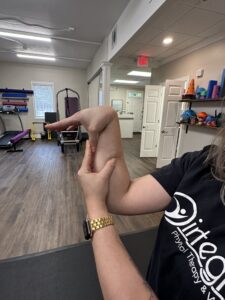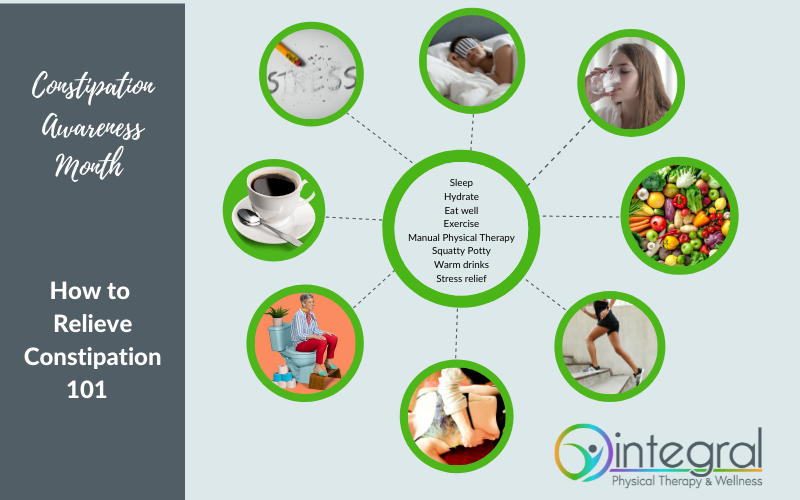As a physical therapist, part of my job is to determine the cause of my patients’ aches, pains, and other symptoms. Sometimes this can be straightforward and easily determined. Other times, it can take several visits and a lot of questions to find the true source of symptoms. And sometimes, we even need to go far back to their childhood and look at body systems outside of the neuromusculoskeletal system. When it comes to a medical diagnosis, some cases are much harder than others.
It is not uncommon for hard-to-diagnose patients to go from provider to provider looking for answers, only to be told that it is just “in their head,” or due to depression or anxiety. Too often, hard-to-diagnose patients are told to just live with the pain and discomfort. That is exactly what happened to me.
My symptoms seemed unrelated and were difficult to diagnose.
Since my teen years, I have suffered from the following symptoms:
- Sharp abdominal pain
- Significant constipation (bowel movements once every 4-5 days, sometimes longer)
- Significant bloating (after just a bite of any food)
- Nausea
- Stress incontinence
- Anxiety
- Depression
In recent years, I have also been struggling with the following:
- Weight gain
- Increased fatigue
- Loss of sleep
- Heart palpitations
- Episodes of nearly fainting
- Unexplained allergic reactions causing rashes and swelling
- Worsened food sensitivities (gluten, dairy, alcohol, acidic foods/drinks)

Joint hypermobility (shown here in my thumb) is one of the physical traits I’ve had since birth.
I also have these physical genetic attributes:
- Abnormally translucent skin
- Abnormally stretchy skin
- Joint hypermobility (double-jointed)
- Dental crowding
- Flat feet
Bouncing around from doctor to doctor since I was a teen, I was given misinformation so often that I simply stopped trying to find answers. But in the summer of 2022, I finally had enough and started to look for answers on my own.
Looking at my list of symptoms, they appear unrelated. The more I thought about it, however, the more convinced I became that there had to be a connection.
Some of my patients exhibited similar symptoms.
I began to put the pieces together when I started treating patients with hypermobile Ehlers Danlos Syndrome (hEDS) and Hypermobility Spectrum Disorder (HSD). HSD and hEDS and are genetic conditions that cause dysfunction in collagen linkage, causing laxity in ligaments and other connective tissue. HSD is a spectrum disorder, and hEDS is the extreme end of this spectrum. I came to realize that almost all my patients with either of these conditions had almost the same symptoms that I did. The revelation stunned me.
I researched hEDS and the conditions that are commonly associated with it. One such associated condition mimics Irritable Bowel Syndrome (IBS). When I was a teen, GI specialists told me I had IBS. This is basically a catch-all diagnosis for when no real diagnosis can be found. Some of the treatments for IBS worked for a little while, but nothing gave me consistent relief.
I worked closely with other health professionals to confirm my diagnosis.
When I got older, my gut feeling (pun intended) told me that my issue was not IBS. Rather, it was something entirely different, especially since I started working with hEDS patients and researched the condition. So, with the blessing of my current GI physician (whom I love), I initiated some home treatments. After some time, I talked to the PA for my GI physician about the effects of these home treatments and my suspicions. Only after breaking down in tears did the PA agree with my suspicions. I had been suffering all these years from Mast Cell Activation Syndrome (MCAS).
MCAS is a condition that is often seen alongside hEDS/HSD, where the body has an abnormal immune response to different stimuli. This would not only explain my gut symptoms but also my random allergic reactions to different substances throughout my life.
While my gut issues were the most prominent pain in my life, I was also becoming more worried about my worsening arrhythmias or irregular heartbeat. I was able to find a hypermobility specialist who was also a cardiologist. They verified that I “very likely” have hypermobile hEDS. The only downside is that hEDS cannot be concretely diagnosed, as the gene linked to this syndrome has not yet been found. Regardless, my suspicions were confirmed by a specialist.
From misdiagnosis to an accurate diagnosis and understanding my symptoms
All these years, my condition had been misdiagnosed. It wasn’t IBS, or anxiety, or depression, or stress-related issues. All the symptoms I have had for years were actually due to hEDS, or at the very least, HSD.
The last piece of the puzzle was to figure out why all my symptoms had worsened over the last three years. For this, I realized there were only two possibilities: hormone imbalance, and/or my mental health.
I had an IUD inserted a month before quarantine began in 2020. So, it had been difficult to distinguish whether it was the effects that COVID had on my mental health or if it was the IUD. Since I have been seeing a therapist regularly and taking a helpful regimen of medication for anxiety and depression, I decided to have my hormonal IUD removed. My gynecologist also confirmed that my IUD, being progesterone-based, did likely play a role in my worsening symptoms. This is the first time my body has been free of birth control in 12 years, and I am so excited to finally allow my body the time to heal and function the way it SHOULD.
Going through this discovery process has led me to my lowest points of depression and elevated me to my highest levels of happiness. I realize that health and wellness is not a destination, but a journey that will change and vary over my lifespan.
I see a psychologist, a psychiatrist, a GI specialist, an OBGYN, a functional medicine doctor, a physical therapist, and even a chiropractor on occasion. I’m on several medications and supplements to help maintain my mental health, gut health, and immune response. But the most crucial change has been the movement I have incorporated into my life. I exercise to keep my body pain-free and use physical therapy to keep my joints and muscles working at their optimum function.
I learned to make my own health and wellness a priority.
Ultimately, the only person who truly understands your body is YOU. So, if your healthcare provider is not listening to your concerns and needs, it’s time to change your provider. I promise, there is someone out there who will understand and help, and this is why self-advocacy is of the utmost importance.
So, what is the moral of my story?
Recognize the importance of self-care, as well as advocating for your own physical and mental needs. My health and wellness are my priority.
If my story resonates with you at all, contact us, and let’s see if we can start to help you feel better. The cornerstone of fighting a lot of these symptoms begins with movement and exercise, but finding the RIGHT exercise for your body. Fight for your health and happiness because you deserve it.
Integral Physical Therapy is located in the heart of East Cobb, minutes from downtown Marietta, Sandy Springs, and Roswell.
*Disclaimer: This blog post is not to be taken as medical advice. It is simply to outline a person’s experience within the medical system. Please consult your healthcare provider before trying any treatments at home.*





